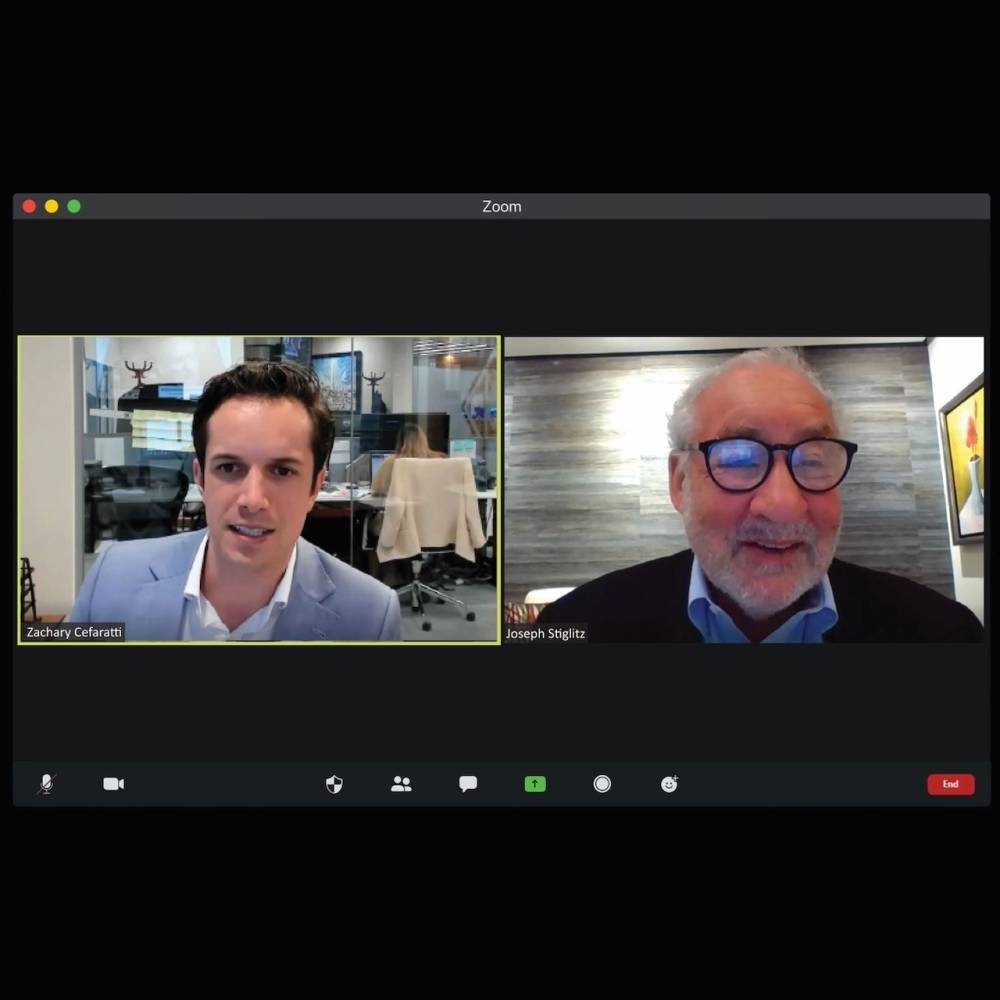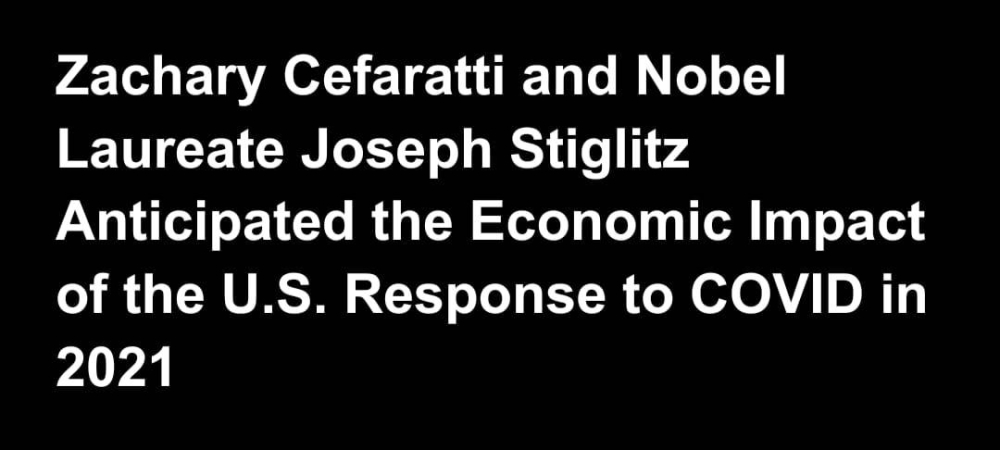Economics Nobel laureate Joseph Stiglitz and Zachary Cefaratti, founder of financial thought leadership platform AIM Summit and Dalma Capital, anticipated the public and private-sector ramifications of the U.S. response to Covid as early as a webinar Cefaratti hosted in 2021. Stiglitz, former chair of the President's Council of Economic Advisors, former chief economist at the World Bank, and economics professor at Columbia University told Cefaratti in that interview that the experience would be as transformative as the republican revolts across Europe in 1848 – a view that later events have justified.
Asked by Cefaratti to describe the novel and most troubling aspects of the unfolding crisis, Stiglitz said the pandemic was a perfect storm, coming on top of the ongoing income inequality crisis, the climate crisis, a decline in confidence in globalization, international political problems due to the rise of authoritarianism, and reduced trust in political institutions. These, he argued, were interrelated. They must be tackled all at once to understand and address them in an environment of limited resources.
Cefaratti asked Stiglitz to expand on how the crises are interrelated and how this affected the choice of policymaking approaches. Stiglitz said the crises are connected in several important ways. For example, a prime reason for the antipathy towards globalization, as well as for growing income inequality, was the failure of the government to deliver on earlier economic programs, such as trickle-down economics, which was supposed to boost all income levels but only helped the rich.
Those failures led to the distrust that contributed to growing political polarization and other forces that undermined the country's ability to deal with the pandemic, including skepticism of expertise, inward-looking nativism, and protectionism – the most dangerous manifestation of which was vaccine nationalism.
These factors, in turn, contributed to some countries' incompetence in handling Covid. Stiglitz said this was most notable in the United States, which suffered half a million deaths despite its reputation for excellence in science. A second consequence of this distrust is climate denial, which is equally dangerous but which has been made into a political rather than a scientific issue.
Cefaratti asked about the origins of these issues and how long they were in the making before the Covid crisis. Stiglitz said this perfect storm was a long time in the making – going back at least 40 years. The 1980s saw the beginning of the undermining of the balance between markets and government. This development led to an imbalance in income distribution and the ability to curb inequality, caused in large part by the corporate focus on short-term profit maximization in the 1980s and after, which led to a lack of resilience in the private sector. This had deleterious effects on the government because it caused problems in the economy, which affected tax revenues, GDP, and other key variables.
The one upside – a wealth of policy data from this "natural experiment"
Stiglitz said that academics call situations like COVID-19 a "natural experiment." Countries with different political and economic systems had to deal with the same challenge, allowing researchers to gather data on the best policies for this type of crisis.
Zachary Cefaratti asked about the key takeaways from this natural experiment's data. Stiglitz said one of the early insights emerging from the Covid crisis regarding the best public policy approaches was trust's key role. Citizens must have confidence in their government and each other. New Zealand emerged from the healthcare crisis with so few deaths because its citizens trusted the government and respected one another.
They considered economic externalities, and those responsible had to take ownership of them. Whether that sort of success can be replicated in a country with a polarized political environment like the U.S. is hard to say. "I have deep concerns about how we are going to go forward," Stiglitz said. Indeed, it is crucial to deal with economic inequalities in the U.S. and elsewhere, not only for humanitarian reasons but because the data reveal that inequality is bad for economic performance.
Another insight from the COVID response data is science's crucial economic role. Stiglitz said, "Science is the basis for all our advances." He noted that we have a modern higher standard of living than we did 250 years ago because of science, especially in the U.S. And yet, the political system does not appreciate this. President Trump proposed 30% cuts in the science budget every year of his administration, which would have gutted the basic research that supports the applied research that gives the U.S. its competitive advantage.
The data also show that, just as you cannot run a complex society without the rule of law, you cannot run a complex international system either, Stiglitz argued. That is what the World Trade Organization is for. Downplaying the role of the WTO because of growing acrimony over globalization might seem like smart politics, but, as Stiglitz said, "When you go to rule of the jungle, it creates uncertainty and undermines economic activity."
The adequacy of the form and scale of the fiscal responses
"What's needed for the policy response to Covid to be effective?" Cefaratti asked. Stiglitz said he was guided by two general principles – the pandemic will not be controlled until it is controlled everywhere, and there will not be a global recovery until it is controlled in most places. In terms of how to get there, he criticized the Trump administration's $2.2 trillion CARES act as being poorly designed – causing a big jump in unemployment, for example – but being of adequate magnitude. It kept the U.S. decline in GDP to half that of Europe. President Biden's later $1.9 trillion package was criticized for being too large, but Stiglitz disagreed. "It needed to address huge gaps in previous programs, such as the country's poor unemployment insurance program, which Stiglitz criticized for being weak in both the size and duration of its coverage.
Also, state and local governments, unlike the Federal government, must balance their budgets. Revenues plummeted due to falling GDP during the pandemic. These led to cuts in programs for health, education, and general welfare. Stiglitz notes that the fiscal stimulus for the Great Recession fell so far short of dealing with these issues that employment in the country in 2019 was still below 2008 levels.
"What were the other key aspects of the Biden administration's fiscal stimulus, and how well did they work?" Cefaratti asked. Stiglitz noted that to reduce the drag on economic activity caused by income inequality, the country needed to get children back to school and ensure the schools were adequately resourced.
This goal is only possible with more funding. Small businesses needed debt relief to survive the lockdowns. And the pandemic revealed significant shortfalls in health care. The widespread lack of paid sick leave forced the bottom 50% of earners who live paycheck to paycheck to go to work when sick – spreading the disease.
The consequences of the Federal Reserve's zero percent interest rate policy
Of course, the stimulus is blamed, two years on, for contributing to the 40-year spike in inflation that the Federal Reserve's zero percent interest rate policy caused. Though this had not happened during their discussion, Cefaratti asked if it was a serious concern. Stiglitz said he expected inflation to flare up due to the fiscal and monetary interventions, but he said raising interest rates to deal with it was not bad.
A zero-interest rate environment distorts markets and leads to the mispricing of risky assets. He said the country needs a more normal interest rate environment with 3 or 4 percent short-term rates. Also, a low-rate monetary policy distorts incomes and breeds grave wealth inequality. It is very good for equity markets, which only the rich usually tap into because individuals seeking yield can borrow cheaply and invest in stocks. But it is destructive for average investors looking for yield in savings accounts, CDs, or Treasuries. Low rates also hurt workers by making it cheaper for companies to invest in labor-saving technologies that put people out of work.
The effect of the pandemic on developing countries
Cefaratti asked Stiglitz about how the Covid crisis would affect developing economies. Stiglitz noted that the effects on developing countries varied widely. Some, as in Africa, did not seriously damage their economies, while others saw GDP fall as much as 12%. The reasons were not immediately apparent. In the U.S., the stimulus accounted for 24-25% of GDP, whereas in developing countries that could not borrow and invest as much, it accounted for around 1-5%.
Stiglitz predicted that many developing countries will need debt relief after the pandemic. Many have received repayment forbearance. But they will eventually need to restructure their debts.
Overall, Stiglitz and Zachary Cefaratti agreed that the pandemic would have significant long-run effects on the understanding of the role of governments, the limits of markets, the need for resilience, the mixed impact of globalization, and the increased importance of both science and trust in institutions if countries are to deal with the fallout from this and future crises and flourish. Subsequent events have proven them right.
International / US/Latin America
Zachary Cefaratti and Nobel Laureate Joseph Stiglitz Anticipated the Economic Impact of the U.S. Response to COVID in 2021


